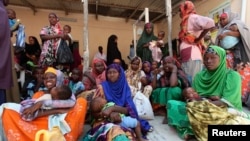MOGADISHU —
Somali women activists recently shared their experiences and challenges with the United Nations Special Representative of the Secretary-General for Somalia (SRSG), Nicholas Kay at a meeting in Mogadishu.
The women from different groups across the country raised discussions about protecting human rights, promoting women's political participation and addressing sexual and gender-based violence.
Somalia has been plagued by civil war, anarchy and Islamist insurgencies for over 20 yeas. Women carried the heaviest burden - struggling to care for their children and to survive in the insecurity.
But analysts say women, especially in the capital, Mogadishu are seeing more opportunities than ever before.
In September last year, Somalia held peaceful presidential elections, the first since military dictator Mohamed Siad Barre was overthrown by warlords in 1991.
Meetings like these help spread the word on what Somali women need to improve their lives, participant Fartun Abdisalaan Adan, director for a local human rights group said.
“This meeting is very important for us, because we have a channel we can go through, because if you are on the grass root level working as NGOs it's very difficult to reach the government and the U.N.,” she said.
“You can see how many women just talking what they need, just to listen they need someone to listen. This country, we are the majority and we act like a minority,” she added.
Kay said the U.N. would play an active role in improving access to justice for women and girls, particularly in relation to gender based violence, supporting women's leadership, political participation and the importance of ensuring coordination of government efforts with development partners to support women's rights.
“I learned at least that there is a very vibrant, very active network of strong women activists here in Mogadishu which is great. I have learnt also, real concern still about the political stability and security in the country and a determination not to return to the civil war of the last decade a very strong will to see peace in the country and also very strong support to their Government and the wish that the international community and the U.N support fully the federal Government here,” said Kay.
In a 2011 expert poll, Somalia ranked fifth most dangerous country to be a woman due to a catalog of dangers including high maternal mortality, rape and female genital mutilation, along with limited access to education, healthcare and economic resources.
The women from different groups across the country raised discussions about protecting human rights, promoting women's political participation and addressing sexual and gender-based violence.
Somalia has been plagued by civil war, anarchy and Islamist insurgencies for over 20 yeas. Women carried the heaviest burden - struggling to care for their children and to survive in the insecurity.
But analysts say women, especially in the capital, Mogadishu are seeing more opportunities than ever before.
In September last year, Somalia held peaceful presidential elections, the first since military dictator Mohamed Siad Barre was overthrown by warlords in 1991.
Meetings like these help spread the word on what Somali women need to improve their lives, participant Fartun Abdisalaan Adan, director for a local human rights group said.
“This meeting is very important for us, because we have a channel we can go through, because if you are on the grass root level working as NGOs it's very difficult to reach the government and the U.N.,” she said.
“You can see how many women just talking what they need, just to listen they need someone to listen. This country, we are the majority and we act like a minority,” she added.
Kay said the U.N. would play an active role in improving access to justice for women and girls, particularly in relation to gender based violence, supporting women's leadership, political participation and the importance of ensuring coordination of government efforts with development partners to support women's rights.
“I learned at least that there is a very vibrant, very active network of strong women activists here in Mogadishu which is great. I have learnt also, real concern still about the political stability and security in the country and a determination not to return to the civil war of the last decade a very strong will to see peace in the country and also very strong support to their Government and the wish that the international community and the U.N support fully the federal Government here,” said Kay.
In a 2011 expert poll, Somalia ranked fifth most dangerous country to be a woman due to a catalog of dangers including high maternal mortality, rape and female genital mutilation, along with limited access to education, healthcare and economic resources.





